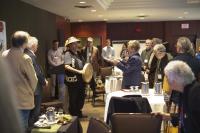
From February 18-20th, community-engaged academic and community researchers, educators, practitioners, policy analysts and research administrators gathered in Vancouver, British Columbia to explore what it really means – and what it takes – to work collaboratively in Indigenous research.
The Working Better Together Conference on Indigenous Research Ethics explored the dynamic intersection of policies, procedures, practices, and philosophies of contemporary Indigenous research ethics. The conference goal was to create a space for timely exchanges and thoughtful reflections that will inform contemporary Indigenous research ethics thought, policy and practice. The interactive design supported networking and resource sharing among the 80 participants who actively shared their experiences and inspired one another.
The event was organized by the Intellectual Property in Cultural Heritage (IPinCH) project based at Simon Fraser University and co-sponsored by the POLIS Project on Ecological Governance and the Centre for Global Studies at the University of Victoria, and the Ethics Program of the International Society of Ethnobiology Alliance for Biocultural Diversity. Major funding was provided through an Impact (Partnership) Award from the Social Sciences and Humanities Research Council (SSRHC).
- Website: indigenousResearchEthics2015.wordpress.com
- Event write-up — Indigenous Research Ethics Conference A Success (Mar 2015)
- Conference flyer (PDF)
OPENING CEREMONY AND WELCOME
Traditional Opening and Territorial Welcome by Victor Guerin, Musqueam First Nation
Welcome from Simon Fraser University by Dr. Andrew Petter, President and Vice-Chancellor, Simon Fraser University
Welcome and Opening Comments by IPinCH Project Director by Dr. George Nicholas, Project Director, IPinCH Project; Department of Archaeology, Simon Fraser University
Conference Overview by Dr. Kelly Bannister, Conference Chair
TS'LHNUTS'UMAAT: TRADITIONAL TEACHING ABOUT BEING "THE WHOLE FAMILY" by Coast Salish Elder Florence James
BEING IN MOVEMENT by Dr. Paul Linden (6th Dan), Columbus Center for Movement Studies
KEYNOTE PRESENTATIONS: Indigenous Concepts And Values Informing Contemporary Research Ethics In Canada
Dancing Particles by Willie Ermine, Professor, First Nations University of Canada
Reflections on the Evolving Dialogue on Indigenous Research Ethics by Dr. Marlene Brant Castellano, Community Co-chair, Aboriginal Council of Queen’s University
SESSION 1 Implementing TCPS2 in Collaborative Indigenous research – Policy, Funder, Institution and Project Perspectives
- Research involving First Nations, Inuit and Métis Peoples – Genesis of a chapter by Susan Zimmerman, Executive Director, Secretariat on Responsible Conduct of Research
- Inside Out: A New Aboriginal Paradigm for a Code of Ethics by Dr. Jim Frideres, (former) Chair, National Panel on Research Ethics (PRE)
- Initiatives to support Aboriginal research and talent development by Gail Zboch, Senior Program Officer, Research Grants and Partnerships Division, SSHRC
- Square peg in a round hole by Jeff Toward, Director, Office of Research Ethics, Simon Fraser University
- Lessons learned from University-based collaborative research with Indigenous partners by George Nicholas (Discussant), Project Director, IPinCH Project; Department of Archaeology, Simon Fraser University
SESSION 2 Actualizing Indigenous Values and Methodologies in Ethics Policy-making and Practice
- Dismantling Eurocentricism – Indigenous research prompts value transformations in knowledge discourses by Dr. Margaret Kovach, Professor, College of Education, University of Saskatchewan
- When Research Involves Indigenous Communities How Can Research Ethics Boards Contribute Positively? by Eugenie Lam, Research Ethics Coordinator, Human Research Ethics Board Office, University of Victoria “
- International Instruments and Indigenous Research in Canada: A Tale of Four United Nations Agreements by Yvonne Vizina, Doctoral Student, School of Environment and Sustainability, University of Saskatchewan
- Indigenous Peace in Research by Dr. Shaun Hains, Educator, Edmonton Public Schools
- Fostering Better Collaboration with Nuu-chah-nulth Social Contract Theory by Eli Enns, North American Coodinator, ICCA Consortium Tribal Parks and Research Associate, POLIS Project on Ecological Governance, University of Victoria
- Sovereignty-Driven Research Ethics: Beyond Baseline Compliance, Consent, and Limitation of Liability by Dr. John Welch (Discussant), Professor, School of Resource and Environmental Management and Department of Archaeology, Simon Fraser University
DAY 2 WELCOME by Coast Salish Elder Florence James
SESSION 3 Overcoming Challenges to Collaboration: Innovative Agreements and Partnership Arrangements
- Legal Contexts for Implementing Ethical Aspirations in TCPS 2 by Catherine Bell, Professor, Faculty of Law, University of Alberta
- Ethical Considerations and Challenges When Combining Indigenous Traditional Medicine and Evidence-Based Biomedical Science by Dr. Pierre Haddad, Professor and Principal, CIHR Team in Aboriginal Antidiabetic Medicines, Université de Montréal
- Taking Responsibility, Building Relationship in the Coast Salish Way by Dr. Ewa Czaykowska-Higgins, Professor, UVic and Deanna Daniels, (former) Steering Committee Chair, Coast Salish Language Revitalization CURA Project, University of Victoria
- Ktunaxa Research Ethics Policy in the Making by Craig Paskin, Manager of Policy and Planning, Lands and Resources Sector, Ktunaxa Nation Council
- Challenges & Strategies for Building Ethical Space in Diverse Stakeholder Collaborations by Dr. Nicole Aylwin (Discussant), Acting Executive Director, Canadian Forum on Civil Justice
SESSION 4 Continuing Education and Innovation in Research Ethics Theory and Practice
- Turning theory into practice – Efforts to support implementation of Chapter 9, TCPS 2 by Susan Zimmerman, Executive Director, Secretariat on Responsible Conduct of Research
- Building Connections to Foster Ethical Research Through the Carleton University Institute on the Ethics of Research with Indigenous Peoples (CUIERIP) by Dr. Katherine Graham, Professor, Carleton University and Lead, Aboriginal Research Ethics Summer Institute
- Toolbox of Principles for Research in Indigenous Contexts: Ethics, Respect, Equity, Reciprocity, Cooperation and Culture by Dr. Karine Gentelet, Research Associate, Research Center of Public Law, Université de Montréal
- Insights into Indigenous Learning by Dr. Shaun Hains, Educator, Edmonton Public Schools
- Discussant Comments by Willie Ermine, Professor, Department of Indigenous Languages, Arts and Cultures, First Nations University of Canada
SPECIAL CONTRIBUTIONS
Musical Facilitation with Native American Flute by Dr. Vicki Kelly, Indigenous Scholar and Associate Professor, Faculty of Education, Simon Fraser University
Youth Statement by Mike McKenzie, Youth Representative, National Association of Friendship Centres
KEYNOTE SPEAKER CLOSING REFLECTIONS by Dr. Marlene Brant Castellano and Professor Willie Ermine
CONFERENCE CLOSING
By Dr. George Nicholas (IPinCH Project Director), Olivia Sylvester (Conference Assistant), Dr. Kelly Bannister (Conference Chair), Dr. Joy Johnson (Vice-President Research, Simon Fraser University), and Coast Salish Elder Florence James





